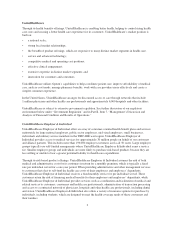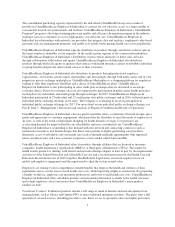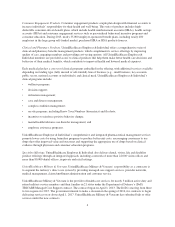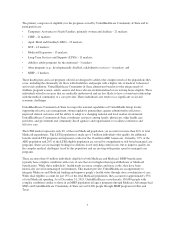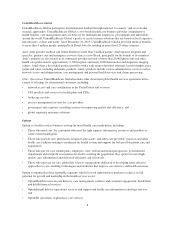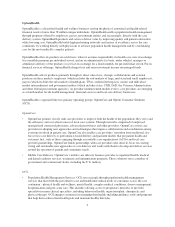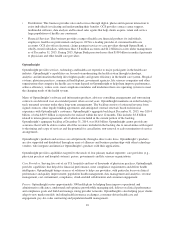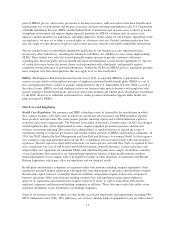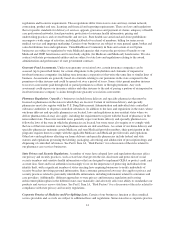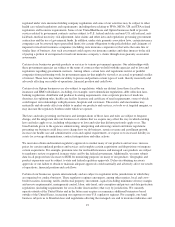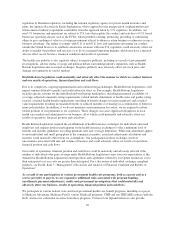United Healthcare 2015 Annual Report Download - page 14
Download and view the complete annual report
Please find page 14 of the 2015 United Healthcare annual report below. You can navigate through the pages in the report by either clicking on the pages listed below, or by using the keyword search tool below to find specific information within the annual report.Federal Laws and Regulation
We are subject to various levels of U.S. federal regulation. For example, when we contract with the federal
government, we are subject to federal laws and regulations relating to the award, administration and performance
of U.S. government contracts. CMS regulates our UnitedHealthcare businesses and certain aspects of our Optum
businesses. Payments by CMS to our businesses are subject to regulations, including those governing fee-for-
service and the submission of information relating to the health status of enrollees for purposes of determining
the amount of certain payments to us. CMS also has the right to audit our performance to determine our
compliance with CMS contracts and regulations and the quality of care we provide to Medicare beneficiaries.
Our commercial business is further subject to CMS audits related to risk adjustment and reinsurance data.
UnitedHealthcare Community & State has Medicaid and CHIP contracts that are subject to federal regulations
regarding services to be provided to Medicaid enrollees, payment for those services and other aspects of these
programs. There are many regulations affecting Medicare and Medicaid compliance and the regulatory
environment with respect to these programs is complex. We are also subject to federal law and regulations
relating to the administration of contracts with federal agencies that are held by our Optum businesses and
UnitedHealthcare Military & Veterans business, such as our TRICARE contract with the DoD. Our business is
also subject to laws and regulations relating to consumer protection, anti-fraud and abuse, anti-kickbacks, false
claims, prohibited referrals, inappropriately reducing or limiting health care services, anti-money laundering,
securities and antitrust.
Health Care Reform. Health Reform Legislation expands access to coverage and modifies aspects of the
commercial insurance market, as well as the Medicaid and Medicare programs, CHIP and other aspects of the
health care system.
Among other requirements, Health Reform Legislation expanded dependent coverage to age 26, expanded
benefit requirements, eliminated certain annual and lifetime maximum limits, eliminated certain pre-existing
condition limits, required coverage for preventative services without cost to members, required premium rebates
if certain medical loss ratios (MLRs) are not satisfied, granted members new and additional appeal rights, created
new premium rate review processes, established a system of state and federal exchanges through which
consumers can purchase health coverage, imposed new requirements on the format and content of
communications (such as explanations of benefits) between health insurers and their members, introduced new
risk sharing programs, reduced the Medicare Part D coverage gap and reduced payments to private plans offering
Medicare Advantage.
Health Reform Legislation and the related federal and state regulations are affecting how we do business and
could impact our results of operations, financial position and cash flows. See also Part I, Item 1A, “Risk Factors”
for a discussion of the risks related to Health Reform Legislation and related matters.
Privacy, Security and Data Standards Regulation. The administrative simplification provisions of the Health
Insurance Portability and Accountability Act of 1996, as amended (HIPAA), apply to both the group and
individual health insurance markets, including self-funded employee benefit plans. Federal regulations related to
HIPAA contain minimum standards for electronic transactions and code sets and for the privacy and security of
protected health information. ICD-10, the new system of assigning codes to diagnoses and procedures associated
with health care in the United States replaced ICD-9 code sets as of October 1, 2015, and health plans and
providers are now required to use ICD-10 codes for such diagnoses and procedures for dates of services on or
after such date. Coding informs analytics and patient care decision making, so accuracy is critical to achieving
the highest quality of care and delivering the best possible outcomes for patients.
The Health Information Technology for Economic and Clinical Health Act (HITECH) significantly expanded the
privacy and security provisions of HIPAA. HITECH imposes additional requirements on uses and disclosures of
health information; includes new contracting requirements for HIPAA business associate agreements; extends
12


